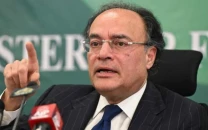Holding company for state-owned enterprises restructuring may be self-defeating approach
Accumulated debt of 200 public enterprises has now surpassed Rs1 trillion mark

Representational image. PHOTO: REUTERS
In view of that, the government is now floating a proposal to make provinces share security expenditures and cost of subsidies for the Benazir Income Support Programme (BISP) in the next National Finance Commission (NFC) Award.
The root cause of reduced fiscal space, however, remains the failure of the Federal Board of Revenue (FBR) to meet the tax-to-gross domestic product (GDP) target of 14% and the frequent need to bail out debt-ridden state-owned enterprises (SOEs). In fact, the accumulated debt of these 200 public enterprises has now surpassed the Rs1 trillion mark and stands at 4% of GDP. But when it comes to reforming these SOEs, a policy framework for managing them is completely missing.
It is assumed that these public companies will ultimately face privatisation after reforms but such initiatives are often put on the back burner by the body politic due to issues of patronage. So indirectly, taxpayers have become “cash cows”, injecting millions into pockets of bankrupt SOEs like Pakistan Steel Mills with no output.
The curious case of Sarmaya-e-Pakistan
When it comes to reforming these white elephants, the current government has opted for a state-directed capitalism model similar to that of China. The government has recently established a new holding company Sarmaya-e-Pakistan Limited (SPL) under the Ministry of Finance, which will be responsible for governing around 200 public limited companies after removing the role of line ministries concerned in administrative decisions of these enterprises.
The restructuring is aimed at eliminating bureaucratic interference and appointing a professional board for the oversight of public companies. Five verticals - power, oil and gas, manufacturing, financial services and logistics - have been established for providing specialist advice to the boards of companies under the control of SPL.
The SPL board has only three ex-officio members including secretaries of finance, power, and industries and production. Secretaries of energy and logistics-related ministries such as of railways, communications and ports and shipping are not represented despite the presence of a relevant functional ‘vertical’ in the holding company.
For all practical purposes, the company is being controlled by the finance ministry with the finance secretary designated as the first CEO of SPL.
Female representation on the boards of public companies has been less than 5% historically and the newly engineered SPL is no different. L’Oreal (Pakistan) MD Musharaf Hai is the only female director out of 11 in total.
Ehsan Malik, who has been elected chairman of the board, is also CEO of the Pakistan Business Council (PBC). The PBC was established by large private-sector players and conglomerates in 2005 to promote their interests, so Malik’s election may be a case of conflict of interest.
Moreover, since the top bleeding SOEs include electricity distribution companies and public transport infrastructure companies, it is hard to wrap head around the fact that none of the appointed directors possess expertise in these sectors - though two directors have experience in power generation and freight operations.
Lessons from history
Lessons from history, however, reveal that the cabinet is repeating the same mistakes that governments committed in the past. In the 1970s, a holding company called the Pakistan Banking Council (PBC) was established under the control of finance ministry to govern all public sector banks – a move that weakened the regulatory authority for decades.
PBC got infested with bureaucratic approach, defeating the whole purpose of bringing efficiency in the banking sector. The restructuring led to decades of financial repression and fiscal inefficiencies till the dissolution of the holding company in the early 2000s.
The Board of Industrial Management that governed a group of nationalised industries was another failure story. Pakistan Electric Power Company (Pepco), a holding company for the power sector, was a total disaster till it was dissolved in 2010. Similarly, the Experts Advisory Cell was established under the Ministry of Industries and Production to give advice on management of industrial SOEs, but it brought no result.
The way forward
SPL should have the mandate to perform strategic disinvestment and privatisation of sick units instead of mere reforms to improve service delivery and financial viability of SOEs.
Case studies have concluded that results with holding companies for the separation of SOEs from the line ministries have been mixed and there is no guarantee of success.
As a best practice, all SOEs should publish annual reports, business plans and performance baselines as well as develop mechanisms for reporting of key performance indicators (KPIs). Remuneration of directors should be pegged to the actual achievement of these KPIs.
It, however, always pays to strengthen the regulatory bodies concerned. Before reforming SOEs, the regulators should be empowered to approve cost-based tariffs and should remove exclusivity protections.
The Pakistan Telecommunication Authority and the State Bank of Pakistan are two examples of strong regulatory bodies that helped turn around SOEs in telecom and banking sectors over the last two decades. SPL and Chinese models of state-directed capitalism are focused on maintaining control and not fostering healthy market competition.
The writer is a Cambridge graduate and is working as a strategy consultant
Published in The Express Tribune, March 25th, 2019.
Like Business on Facebook, follow @TribuneBiz on Twitter to stay informed and join in the conversation.



















COMMENTS
Comments are moderated and generally will be posted if they are on-topic and not abusive.
For more information, please see our Comments FAQ